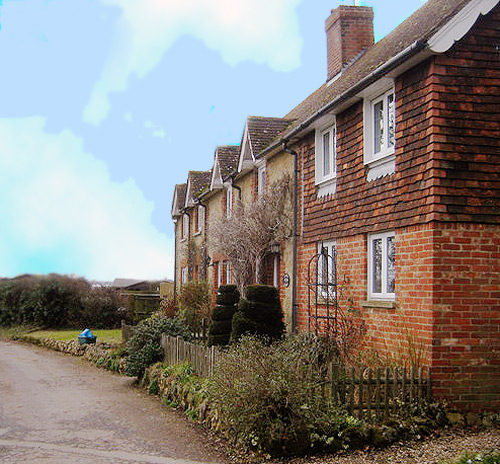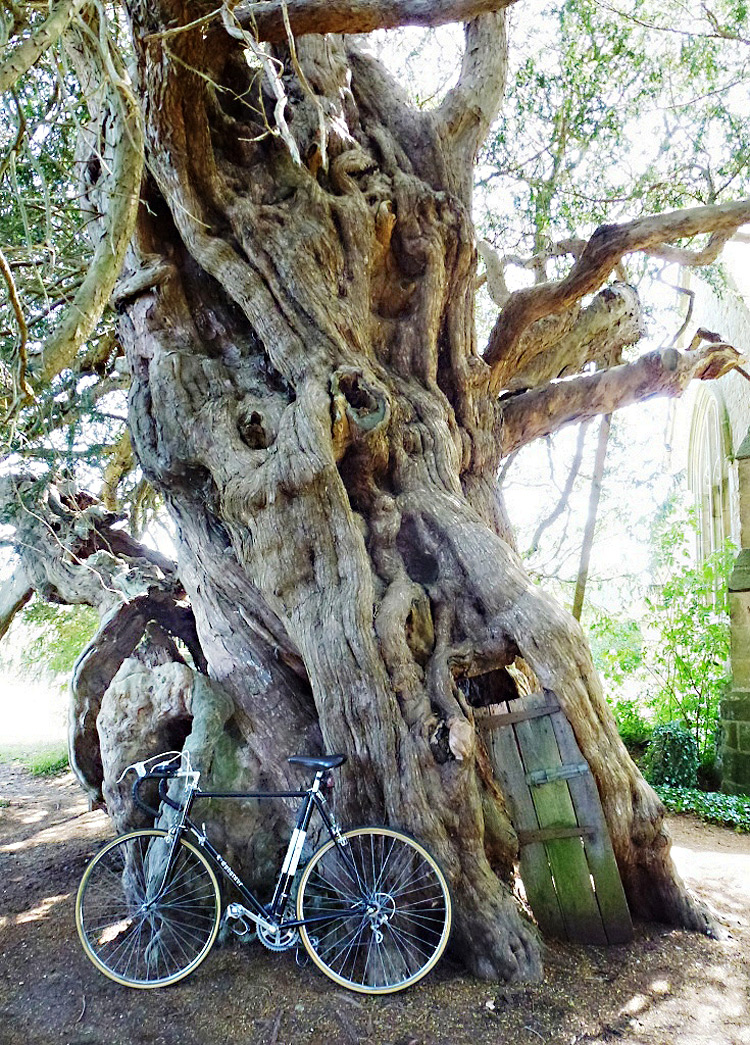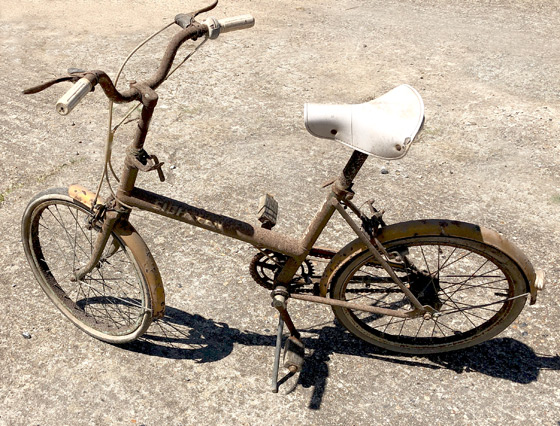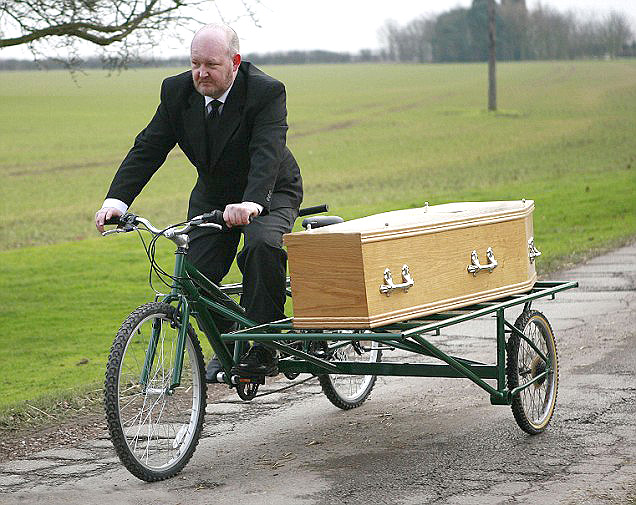|
In view of the
ban on public meetings, the Coronavirus has put paid to the normal range of
Surrey Vintage Vehicle Society outside and inside gatherings. We have therefore encouraged all
our members to take
photographs instead of any of their allowable distancing machinery and share them on
our website. Many of our
Members are of the 'elderly variety' so were hankered deep down thinking of
survival rather than escape, but some have been 'socially cycling' and
have sent photos to
us. PHOTOS WELCOME !!
Our Membership Secretary Chas Moody
is a vintage motorcyclist, and has the years to prove it. Just as
the Coronavirus lock-down was about to happen, he had taken his 1914 Triumph TT
Roadster Motorcycle on the "
Virtual 81st Pioneer Motorcycle Run - 2020 " of which some
photos are on our website, He is also a regular 'modern' sports biker, and he has a much broken leg to prove it,
- he is also a collector of old bicycles. Some of his bicycles and some of his
forays into the springtime countryside are on previous pages of this section.
Chas is also a convert to photography and has sent some lovely photos to
prove it.
Chas describes his "Famous Names Ride" on Sunday 17th May 2020 as
follows: Today's cycle ride includes the ascent of Trevereux Hill, a
private road close to the Kent border which starts from Swaynesland Road,
Edenbridge rising to meet Kent Hatch Road on Limpsfield Chart. Starting from
Hurst Green we head south to Merle Common, pass through Staffhurst Wood into
Monk's Lane followed by Guildables Lane, then at the triangular green before
Moat Farm turn right into Swaynesland Road and where the road turns sharp right,
proceed straight ahead into the private road (but public bridleway) of the
Trevereux Estate.


 Please
Click on the thumbnail photos to see the full size picture Please
Click on the thumbnail photos to see the full size picture
The road rises gently for about 1/3rd mile where we reach the
picturesque Trevereux Cottages (above left) once the home of fashion designer Laura Ashley,
then pass the Grade 2 listed Trevereux Manor, home of Sir Richard Stilgoe OBE
DL, songwriter, lyricist and musician (above right). At this point the road is closed by a
wooden gate preventing vehicular access but a narrow pedestrian chicane opening
to one side can be negotiated with care without dismounting. The flat pasture land of the Weald with its grazing cattle presents an idyllic
rural scene. (below left).
It is now that the bike comes into its own. This one is a 1982-ish "Allin" of West
Croydon which was built for a former SVVS member for use in time trials. Light
weight and with a short wheelbase, it is an excellent hill climber, which is
more than can be said for the rider! The road now climbs 327 feet in just half a
mile, requiring a change to low gear using the unusual drum type handlebar-end
shifters fitted on this machine. As the gradient increases the rider 'stands on
the pedals' to keep momentum and is finally rewarded with the view of 'The Old
School' at the summit (below right), now a private house, with its bell tower formerly used to
summon pupils to their lessons. More rewarding perhaps would be a beer at the
Carpenters Arms across the road but sadly that isn't an option at present!


Turning left into Kent hatch Road then Joining the A25 Westerham road we turn
right through Oxted High Street then out into Barrow Green Road past Barrow
Green Court, the Grade 1 listed home of billionaire Mohamed Al-Fayed (below
Right), returning
through Old Oxted with its many timber framed buildings to base at Hurst Green.
 Please
Click on the thumbnail photos to see the full size picture Please
Click on the thumbnail photos to see the full size picture


Allin Cycles were started by Arch Allin in 1926 and were well known for their
high quality frames. They were in Whitehorse Road, West Croydon from the 1920's
until they closed in 1998. Chas lived near there as a child and went to
Whitehorse School. Their bikes were something to drool at through the shop
window but beyond the realms of the average youngster. The bike may look modern
to our eyes but at 38 years old is more than SVVS eligible and is decidedly 'Old
School' compared with present day carbon fibre or aluminum framed bikes with
sloping top tubes. This is the 'youngest' bike Chas owns, having a lightweight
steel tube frame with horizontal top tube.
Chas Moody describes his next ride, a pilgrimage
to Crowhurst, as follows : Today's visit is to a landmark that is one of
my regular cycle routes. The visit is to the Great Yew Tree at St. George's
Church, Crowhurst in Surrey (not to be confused with the one in East Sussex.).
St George's Church, Crowhurst, is believed to stand on old pagan site at the top
of a small hill and was dedicated in 1191 to St George, the then new patron
saint of England. Mention of of Crowhurst dates back to 772AD. The Church
is of simple design and has a modern steeple due to a fire in 1947. In the floor
is an iron grave slab, the only one in the country and a relic of the local iron
industry. The East Wall is covered in paintings and mosaics and the Victorian window in the Vestry depicts St George and the dragon. Immediately
outside are old tombs including one with 13th century graffiti. Mrs Chairman's
Grandparents and other relatives are buried in this churchyard. Outside are the
flagpole and the War Memorial. Visitors from all over the world come to see the
yew and discover the beauty of the church.



 Please
Click on the thumbnail photos to see the full size picture Please
Click on the thumbnail photos to see the full size picture
In front of the church stands 'The Ancient Yew Tree of Crowhurst'. Most churchyards
had yew planted because they provided the material used by locals to make
longbows since the Roman times. This tree was designated one of fifty Great
British Trees by The Tree Council in 2002. This massive, hollow yew tree is most
impressive and is clearly ancient. Not as old as 4,000 years as some reports
claim but certainly 1,000, possibly 1,500 years old. This venerable specimen has
suffered the effects of both man and nature. The trunk was hollowed out in the
1820's to provide shelter for 12 parishioners and a small door was fitted to an
opening on one side. When the trunk was hollowed out, locals discovered a
cannonball, possibly fired in the English Civil War, embedded in the trunk. The
girth of the trunk, which has pink-ish swirling bark, is about ten metres and
some of the heavy boughs are supported by wooden props necessary to prolong the
survival of this famous historic tree.
.
Today's steed used to make this visit is a 1959 Ephgrave, made by Ephgrave
Lightweights Ltd. of Clapton, East London. Les Ephgrave, who had worked for
Claud Butler, made high-quality frames with the emphasis on finely cut, filed
and feathered, decorative lugwork from 1950 to 1964. As with all other frame
builders in this period of austerity Les was having great difficulty in
obtaining the materials with which to produce his frames. To make
the ‘welded’ frames more attractive he decorated some of these frames with
long pointed bi-laminated lugs with a curl on either side. It is the appearance
of the lugwork on the frames that makes Ephgrave the favourite of the serious
collector. The frame on this bicycle is the No.1 (Lugged) model, one down
from the top-of-the-range No.1 'Super' and has the 'lollipop'
embellishments at the top of the seat stays which Les sometimes fitted. The bike
is a joy to ride and a privilege to own.


 Please
Click on the thumbnail photos to see the full size picture Please
Click on the thumbnail photos to see the full size picture
Not to be undone on the ancient bicycle front, the SVVS
Chairman Bozi Mohacek had
previously rummaged through the cowshed
milking-parlour in amongst the resting agricultural machinery because he
remembered seeing an old dusty much-unused bicycle there. Sure enough, propped
up against an old rusty paraffin dispensing drum was real proper nurse's
bike with wicker basket. This was reported on the 'Cycling Buds of May' page
as being a cca 1951 vintage Rudge Whitworth Pathfinder.
However he was surprised to find next to it a further cobwebbed rusty item which
also resembled a diddy bicycle. Initially it looked a bit like a Moulton with
smallish wheels and exaggeratedly long saddle and handlebar posts. There had
been a Moulton disintegrating quietly during Mother-in-law's time few eons ago,
but this seems to have gone to the great recycling depot in the sky. This was
not it. This was apparently a Raleigh Eighteen. Mrs Chairman was not quite sure
where this bike came from, saying probably one of her mother's jumblesale
purchases, but from what I could remember it belonged to a horse-whisperer lady
who stayed at the Farm before we got married, about half century
ago, and before she emigrated to Australia. To my knowledge the bike had not moved
under its own locomotion since. Unlike the other bike. the tyres were flat but
normal tire shape rather than grotesquely decomposing.

Raleigh is a British Bicycle Company founded in Nottingham in 1885 and is one of
the oldest bicycle companies in the World. It started in three small workshops
and a greenhouse. By 1913 Raleigh was the largest bicycle manufacturing company
in the world. In 1932 Raleigh expanded by buying all the Humber Bicycle Patents
taking over the Humber name. Humber bicycles had stated in 1868 but Humber was
in the early 1930s the second largest UK car Manufacturer and was concentrating
on cars. Under Raleigh, Humber remained a separate premium brand to the 1960s.
From 1921 to 1935 Raleigh also made motorcycles and three-wheel cars. In 1903,
they introduced the Raleighette, a belt-driven three-wheel forecar. with
the driver at the back and the passenger in a wicker seat between the two front
wheels. Production lasted until 1908. In 1930 they acquired the rights to the
Karryall, with a single-cylinder engine of 598cc and the payload of 5cwt. This
was the pre-cursor of the 1933 first three-wheel automobile by Raleigh,
the Safety Seven. Production of vehicles ceised in 1935.
After WW2 Raleigh became known for its lightweight sports roadster bicycles,
often using Sturmey-Archer hubs. These cycles were considerably lighter and
quicker than either the old heavy English utility roadster or the American
"balloon-tire" cruiser bikes. In 1946, Raleigh and other English
bicycle manufacturers accounted for 95% of the bicycles imported into the United
States. By 1960 sales of bicycles had declined and mergers were common. Tube
Investments had formed a competitive British Cycle Corporation which in the
early 1960s then acquired Raleigh.
In 1965, Raleigh introduced the RSW 16, a competitor to the hugely successful
Moulton Bicycle, but it did not have the Moulton suspension. Instead it had large
balloon tyres. This competition resulted in Moulton having financial difficulties and Raleigh
then bought
them out. Raleigh however continued to male the Moulton Bike until 1074.
At the same time
Raleigh introduced the 'Twenty' which they made into the 1980s. It had larger
20inch wheels and less rolling resistance. It became Raleigh's main seller and
140,000 were made in UK alone. Our bike, the Raleigh Eighteen was essentially a
Raleigh Twenty reduced in size by 10%. It differed from the larger model by not
having the bracing struts at the bottom bracket. The Eighteen was introduced in
1972 and was aimed at children and shorter adults. It was available as single
speed or, as on our one, with a three speed twist grip gearchange . The 'Twenty'
range was manufactured until 1984 by which time Raleigh owned a number of their
former competitors. The "Twenty" was sold under many of these names,
including Triumph, Sun, Hercules and BSA.
 
Go to Recent Venues
Page
PICTURE GALLERY INDEX
|















